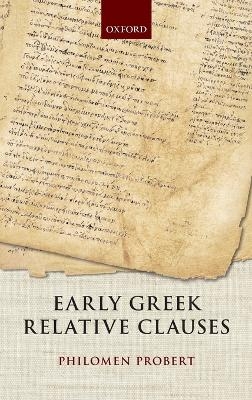
Early Greek Relative Clauses
Oxford University Press (Verlag)
978-0-19-871382-1 (ISBN)
Early Greek Relative Clauses contributes to an old debate currently enjoying a revival: should we expect languages spoken a few thousand years ago, such as Proto-Indo-European, to be less well-equipped than modern languages when it comes to subordinate clauses? Early Greek relative clauses provide a test case for this problem. Early Greek uses several kinds of relative clause, but all these are usually thought to come from one, or at most two, prehistoric types. In a new look at the evidence, this book finds that a rich variety of relative clause types has been in place for a considerable time.
The reconstruction of prehistoric linguistic stages requires detailed work on the individual languages descending from them. A substantial part of the book is therefore devoted to a new look at the relative clause systems found in a wide variety of early Greek texts. It emerges that the same basic system is in use across all these texts. Different kinds of relative clause predominate in different kinds of text, however, because relative clause syntax and semantics interact with the needs of different kinds of text.
Considering material as diverse as the Homeric poems, laws inscribed in stone on the island of Crete, and the philosophical prose of Heraclitus, the discussion remains clear and straightforward as Probert considers the uses and histories of different relative clause types.
Philomen Probert is University Lecturer in Classical Philology and Linguistics at the University of Oxford and a Fellow of Wolfson College.
Acknowledgements ; General Abbreviations ; Abbreviations for Grammatical Categories ; Ancient Authors and Works, with Editions Used ; Epigraphic and Papyrological Publications ; Symbols ; 1. Introduction ; 2. Proto-Indo-European, Greek, and Primitive Languages: The Last 150 Years ; 3. Approaches to Proto-Indo-European Relative Clauses ; 4. What is a Relative Clause? ; 5. Definiteness and Related Concepts ; 6. Varieties of Greek Relative Clause ; 7. Matters of Case ; 8. Forays into Early Greek Relative Clauses in Non-epic Genres ; 9. Postnominal and Inherently Maximalizing Relative Clauses in Homer ; 10. How Does Homer Choose between Inherently Maximalizing Constructions? ; 11. How Does Homer Choose between omicron, eta, tauomicron, and omicronsigmaf, eta, omicron? ; 12. Homeric Relative Clauses in Direct Speech and Narrative ; 13. Cretan Inscriptions to 400 BC ; 14. Against Four Syntactic Relics and For One ; 15. Conclusions ; References ; Glossary of Technical Terms
| Zusatzinfo | 14 black and white illustrations |
|---|---|
| Verlagsort | Oxford |
| Sprache | englisch |
| Maße | 163 x 241 mm |
| Gewicht | 960 g |
| Themenwelt | Literatur ► Klassiker / Moderne Klassiker |
| Geisteswissenschaften ► Sprach- / Literaturwissenschaft ► Anglistik / Amerikanistik | |
| Geisteswissenschaften ► Sprach- / Literaturwissenschaft ► Literaturwissenschaft | |
| Geisteswissenschaften ► Sprach- / Literaturwissenschaft ► Sprachwissenschaft | |
| ISBN-10 | 0-19-871382-7 / 0198713827 |
| ISBN-13 | 978-0-19-871382-1 / 9780198713821 |
| Zustand | Neuware |
| Haben Sie eine Frage zum Produkt? |
aus dem Bereich


